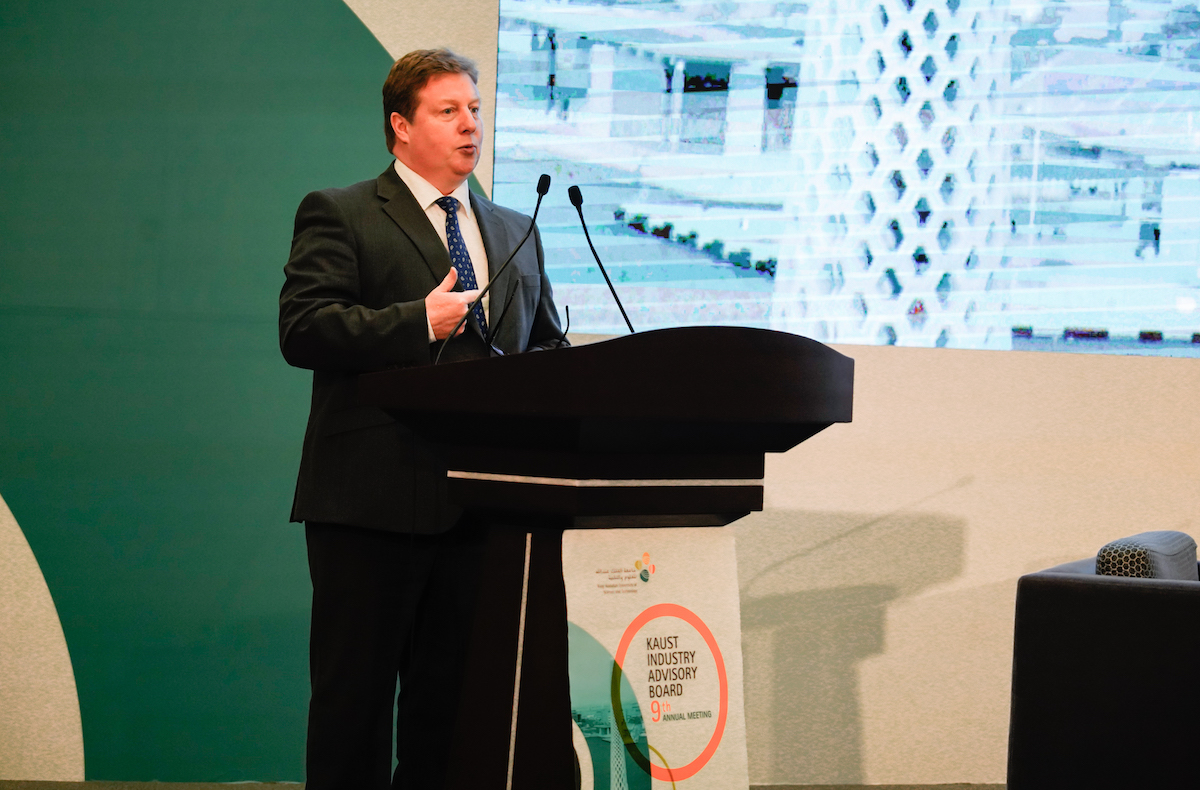Dr. Kevin Cullen takes on academic impact

Dr. Kevin Cullen, an experienced leader in global innovation, is the new vice president of KAUST Innovation and Economic Development. File photo.
Dr. Kevin Cullen has been appointed as vice president of KAUST Innovation and Economic Development. Cullen is a leader in global innovation with expertise in both economic development and industrial engagement. In his new role, he will lead the University's intellectual property portfolio, help create and support new businesses, joint ventures and collaborations with industry partners and continue to foster a strong culture of entrepreneurship at KAUST.
Cullen has over 20 years of experience in academic innovation and business development. Throughout his career, he has helped elevate university-based innovation enterprises that have led to the launch of more than 250 startup companies as well as numerous products and services.
Prior to joining KAUST, Cullen spent six years as CEO of Innovations at the University of New South Wales (UNSW) in Sydney, Australia. He helped transform UNSW from a traditional commercialization unit into an innovation hub by supporting a broad range of university priorities, including economic development and social impact.
Cullen also helped change the debate around university/industry engagement in Australia. He was commissioned by the Australian government to produce a report on the most effective ways to build connections between academia and industry. Most recently, he was appointed to the NSW Innovation and Productivity Committee, where he introduced new approaches to innovation and economic development at the state level.
Partnering universities with industry

Dr. Kevin Cullen speaks during the 9th annual KAUST Industry Advisory Board (KIAB) meeting on the University's campus, which took place from February 21 to 22 this year. Photo by Andrea Bachofen-Echt.
Cullen's next role at the University of Glasgow was different. Asked to deliver a commercialization strategy, his focus was fixed on delivering revenue from the university's intellectual property (IP) portfolio.
At the time, there were some blockbuster IP success stories dominating university commercialization news, like the University of Florida and Gatorade; Florida State University and the chemotherapy drug Taxol; and, later on, the $700 million in royalties from Northwestern University's drug Lyrica. There was less focus on the partnerships and relationships that Cullen had seen work so well.
Generating revenue from university IP
Dr. Kevin Cullen (second from left) takes part in an on campus KAUST event with KAUST Innovation and Economic Development on April 14. File photo.
Former AUTM Presidents Ashley Stevens and John Fraser showed that, on average, university technology transfer programs will commercialize only 25 percent of their invention disclosures. Of these licenses, only 5 percent will ever generate revenue and only 0.5 percent will ever generate over $1 million.
Cullen then wondered: If university revenue isn't the key outcome of academic engagement with industry, then what is?
A new framework for academic impact

Dr. Kevin Cullen speaks to the audience during the 9th annual KAUST Industry Advisory Board (KIAB) meeting on the University's campus from February 21 to 22 this year. Photo by Andrea Bachofen-Echt.
The ability to measure impact became an important driver for Cullen. Over the next decade, he designed the metrics used to assess university funding in Scotland through Knowledge Transfer Grants; the U.K. with the Higher Education Innovation Funding (HEIF); internationally with AUTM and Praxisunico; and later in Australia at UNSW Innovations.
In the U.K., Cullen supported the Higher Education Funding Council for England (HEFCE) in developing the Impact Agenda, leading to the implementation of an impact assessment as part of the Research Excellence Framework (REF). As part of the new system, 20 percent of university block grant funding is based upon the demonstrated impact of the research.
The Knowledge Exchange Model (pictured above) created by Dr. Kevin Cullen, the new vice president of KAUST Innovation and Economic Development, describes the flow of knowledge from research to impact and economic development. Image courtesy of KAUST Innovation/Dr. Kevin Cullen.
While at UNSW Innovations, the Australian Department of Industry commissioned Cullen's team to produce a report recommending appropriate impact metrics. Some of the metrics proposed were based on Cullen's Knowledge Exchange Model, which describes the flow of knowledge from research to impact and economic development. Universities are generally able to track and measure the Knowledge Exchange channels, including consultancy, training, facilities, research, IP and company creation, making these a reasonable process for flow of knowledge.
Academic impact at KAUST
Dr. Kevin Cullen, the new vice president of KAUST Innovation and Economic Development, encourages KAUST researchers to 'think about working with people who are interested in your research and who can use it to make a difference and—in some cases—even to change the world.' File photo.
"KAUST must enhance its reputation by extending excellence in research to excellence in innovation and impact," Cullen said. "We need to make it easier for researchers to get their research put to use by removing the legal, financial and administrative obstacles that typically come with commercialization."
Cullen is a firm believer that there is more desire in the academic community to create impact than most people think.
"I've never met a researcher who didn't want his or her work to make a difference," he noted. "My advice for researchers who want to create impact is: Stop thinking about commercializing your research. Instead, think about working with people who are interested in your research and who can use it to make a difference and—in some cases—even to change the world."
Related stories:
-
Extending collaboration at 2018 Innovation to Impact Forum
-
Subscribing to Vision 2030 at the 9th annual KIAB meeting
-
KAUST and SABB join forces to create innovative startups